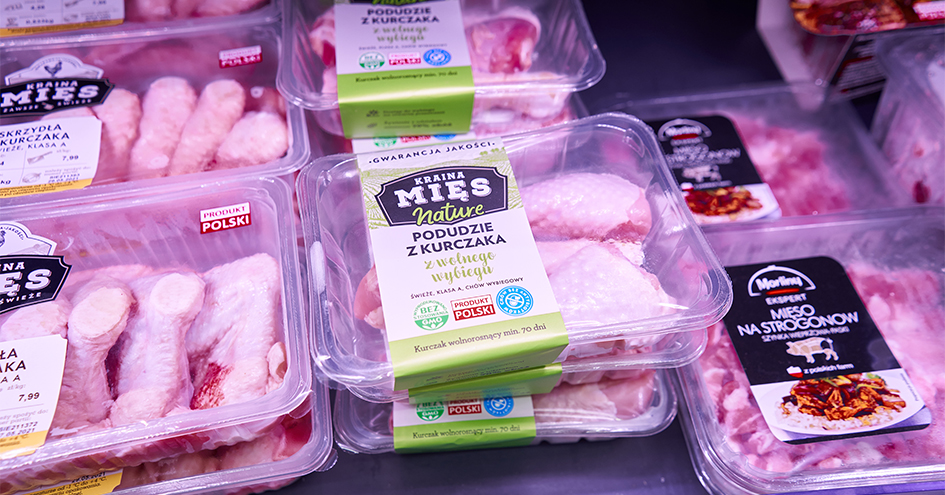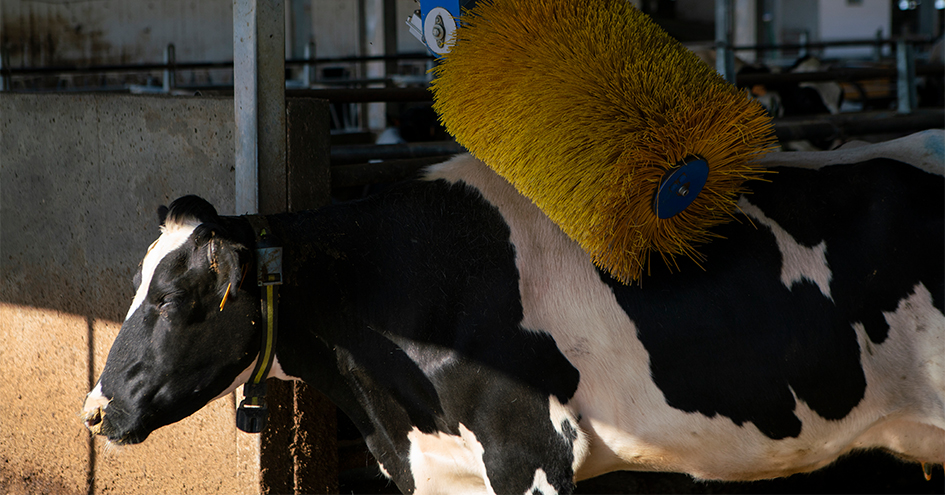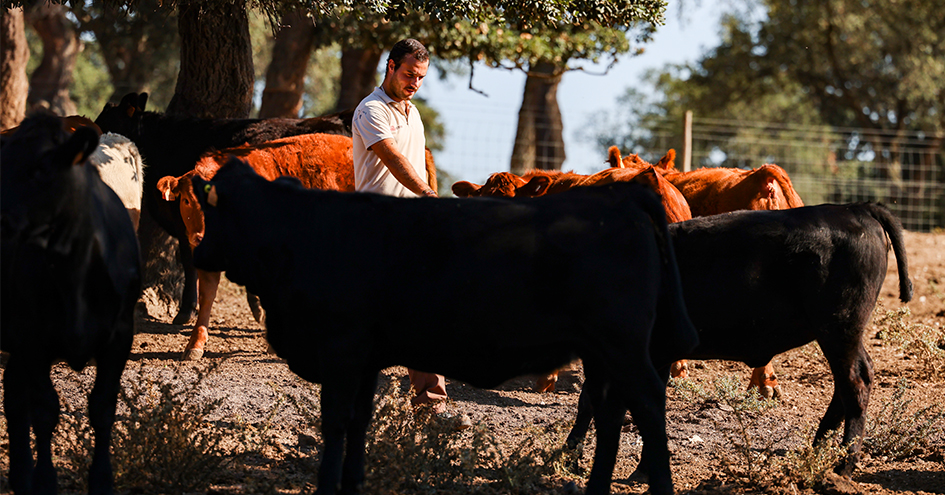We recognise animals as sentient beings and encourage our perishables and Private Brand suppliers and our production units to follow practices aligned with the five freedoms of animal welfare: (i) freedom from hunger and thirst; (ii) freedom from discomfort; (iii) freedom from pain, injury or disease; (iv) freedom to express normal behaviour; and (v) freedom from fear and distress.
Based on these principles, we have established operating standards applicable to all species of animals we market and that can also be applied to our perishable and Private Brand products in the three countries where we operate, and to our production units, most notably:
- prohibiting the use of growth promoters (growth hormones and beta-agonists);
- only using antibiotics for therapeutic purposes, never preventively or to promote growth;
- mandatory stunning of all animals before slaughter1;
- prohibiting animal testing in the development of our products2;
- banning the use of genetically modified or transgenic additives or ingredients, including cloning techniques, whether plant- or animal-based.
Our Policy on Genetically Modified Organisms3 (GMOs) states that companies must:
- cooperate with suppliers to understand the production processes and assess the safety and quality standards implemented;
- regularly carry out laboratory analyses, using independent and accredited entities;
- ensure that suppliers can identify and trace GMOs in the cases where they cannot be replaced;
- guarantee the consumers’ right to information about the presence of GMOs through product labelling4.
We regularly carry out laboratory tests5 and conduct food safety and quality audits6 of suppliers and the slaughterhouses used by our Companies in Portugal, Poland and Colombia to ensure compliance with these principles, complemented by training and awareness-raising initiatives7. These topics are also included on the agenda of the Sustainability Committees of each of the Companies. These meetings aim at defining strategies for action and setting performance objectives, the results of which are made public so as to implement opportunities for continuous improvement. For instance, and as a result of the Sustainability Committees, animal welfare criteria were included in the food safety and quality audits of the perishable meat category, and new animal welfare targets for the 2024 to 2026 period8 were set.
Livestock transport and slaughter practices
In Portugal, we have implemented measures to monitor perishables suppliers by assessing critical indicators to ensure animal welfare. For example, to assess animal transport conditions, we monitor the average duration of transport and the mortality rate during transport.
Average travel time to the slaughterhouse in Portugal – perishables category
(hours)
Mortality rate associated with the trip to the slaughterhouse in Portugal – perishables category
Since 2021, the average transport time in Portugal has been less than 4.5 hours, below the 8 hours stipulated in law as a recommended maximum limit. With regard to transport conditions, the reduced mortality rate (less than 0.25% in all animals) suggests that the animals are not subjected to excessive levels of discomfort, pain or injury. Our goal is to progressively extend this assessment to the other countries where we have operations.
With regard to the practices used by our perishable suppliers at slaughterhouses in Portugal, all animals were stunned before slaughter and more than 98% of stunning was effective at the first attempt (0.3 p.p. more compared to 2022).
Dairy, fresh egg and meat production practices
In our Private Brand and perishables assortment, we integrate animal-based products and ingredients produced in line with animal welfare practices. We also endeavour to raise awareness on these measures among consumers through the use of product labelling and in-store communication actions, commercial leaflets, websites and social media. Below is a description of some of these initiatives.
Beef
In 2023, at Pingo Doce we continued to market Private Brand Angus beef with double antibiotic-free production and animal welfare certification (obtained according to the international benchmark Welfare Quality, and bearing the Welfair™ label), as well as organic beef. In the latter case, we ensure compliance with certification criteria such as access to the outdoors, non-GMO feed, and grazing. Together, Angus beef and organic beef accounted for a 13% weight on sales in the perishable beef category.

Chicken
Biedronka continued to sell its 100% nationally produced free-range chicken, raised antibiotic-free and fed with GMO-free feed. The minimum slaughter age is 70 days (higher than the market average of 14 days) and access to the outdoors with a density below 30kg/m2 is assured, providing up to ten times more area than that of conventional chickens. Biedronka’s assortment also continued to include 100% nationally produced antibiotic-free conventional chicken meat.

At Pingo Doce and Recheio, free-range chickens are 100% raised in Portugal. These chickens have a minimum slaughter age of 81 days and are raised outdoors with a maximum density of 25 kg/m2. Both Companies continued to include the Best Farmer’s free-range chicken, raised mostly outdoors and with an area per animal 30% larger than conventional methods (equivalent to a maximum density of 25 kg/m2). Production is antibiotic-free and animal-welfare certified, approved according to the Welfair™ protocol for welfare assessment (based on the international benchmark Welfare Quality). Thinning is not practised in these operations. Both free-range and Best Farmer’s free-range chickens have access to a natural outdoor environment.
The sale of free-range chicken, animal welfare certified chicken and antibiotic-free chickens at Biedronka, Pingo Doce and Recheio have a 6% weight on the total sales of this perishable category.
Dairy products
The Pingo Doce fresh milk range upheld the Welfair® label, which attests animal welfare certification according to the Welfare Quality protocol, issued by AENOR. The protocol is built on four basic principles: good feed, good shelter, good health and proper animal behaviour. This certification also ensures that dairy cows are free from tethering and tail docking. More than 90% of the producers who supply Terra Alegre’s dairy farm have maintained this certification.

Cage-free chicken eggs
We are committed to ensuring that all Private Brand fresh eggs come from uncaged hens by 2025. Three chicken production systems are accepted: barn, free-range and organic. These systems establish a set of animal welfare criteria and require, for instance, a larger area available per hen, straw bales for the animals to peck at, greater freedom of movement, and perches.

In 2023, 98% of Private Brand fresh eggs (0.4 p.p. more than in 2022) came from uncaged hens. Biedronka9 achieved this goal at the end of 2022, just as Pingo Doce had already achieved it in August 2019. With regard to Recheio, 7 p.p. more cage-free eggs were marketed, ending the year with 35% of sales of Private Brand fresh eggs coming from uncaged hens. Ara does not offer Private Brand fresh eggs in its assortment.
Private brand cage-free eggs
by company
To facilitate the transition to the end of the use of cages, the Group’s Companies have been working closely with their suppliers. In the case of Private Brand eggs, this includes, for example, identifying new production sites and visits by food safety and quality teams to ensure that producers meet the require d criteria. The implementation of alternative production systems to cages also requires time for suppliers to improve their production systems or build new facilities. In these cases, we also give preference to local production, ensuring that more than 95% of the fresh eggs from uncaged hens that we sell in our Private Brands are sourced locally.
Private brand fresh eggs production system
(2019-2023)
Whenever possible, we eliminate the incorporation of fresh eggs from caged hens also into Private Brand products that use eggs as an ingredient. In the case of Biedronka, cage-free eggs have been used in 100% of the Private Brand assortment containing egg as an ingredient since 2022. Pingo Doce and Recheio have also made progress on this commitment, ending the year using cage-free eggs in 61% (10 p.p. more than in 2022) and 39% (4 p.p. more than in 2022) of their Private Brand products that contain egg, respectively.
Practices at Jerónimo Martins Agro-Alimentar (JMA)
JMA is a Group Company specialising in food production to also supply our distribution operations. The Company has four business areas: (i) dairy; (ii) livestock farming (production and fattening of Angus cattle, sheep production, and milk production); (iii) aquaculture (sea bass and sea bream); and (iv) fruit and vegetables (seedless grapes and oranges, both organic, stone fruit and tango mandarin).

Angus cattle are reared by JMA in an area of 6.5 m2 or more per animal, with grooved concrete or rubber flooring to prevent the animals from slipping and getting hurt. We also replace straw used for bedding every day to ensure their comfort and well-being.
At the dairy farm, we provide at least one bed per cow and 60 cm of feeding space. Animals have access to automatic massage brushes and ambient music is played to reduce stress, as well as pasture areas. Barns also have automatic cooling systems that activate fans and sprinklers to cool the animals, which have monitoring collars that enable early detection of pathologies through behavioural changes, thus contributing towards a reduction in the use of drugs.
At our dairy farms and Angus production units, we also ensure:
- the vaccination and de-worming of all animals;
- 100% of animals are free of mutilations (e.g., tail docking and dehorning) and have free movements (they are free from chains);
- automatic cooling systems that activate fans for ventilation and to reduce the amount of ammonia in the air;
- mandatory training in animal welfare for all employees in contact with the animals;
- that no electronic shocks, sticks or any system that may hurt the animals are used when moving or handling them.
In sheep production we ensure a minimum area of 0.6 m2 per animal, more than the recommended good practice of 0.5 m2, and feed based on forage (source of fibre) and concentrate. None of the animals are castrated and they all have freedom of movement.
JMA maintained its certification in the responsible use of antibiotics in its beef production and dairy farm operations. The Welfair™ animal welfare approved certification of these units was also renewed, in accordance with the European Welfare Quality benchmark. Sheep production is also Welfair™ animal welfare certified, based on the AWIN® benchmark.
In the aquaculture of sea bass and sea bream, we ensure the vaccination of all fish that we grow in the open sea with constant currents that guarantee good circulation and water quality. None of the fish are subject to mutilation practices (e.g., cutting of fins) in our aquaculture operations, We use ice-cold water for rapid cooling of body temperature to desensitize the animals during slaughter.
In 2023, JMA increased its financial stake to 25% in Andjford Salmon, a company that has developed an innovative system for sustainable salmon production in Norway.
More information is available on our corporate website, on the “Animal Welfare” page.
1 Except for certified religious rituals such as halal or kosher (which account for less than 5% of total sales).
2 Except for animal food products (for which sensory tests are performed to assess the level of satisfaction of a specific target population) and also products for controlling or eliminating parasites and/or super-populations that might be sources of contamination or disease (e.g., insects).
3 Part of our Product Quality and Safety Policy, available on our corporate website under the Responsibility section.
4 We ensure disclosure in strict compliance with the limit applied by the Group of a maximum of 0.1% (within the method’s quantification limit). The limit allowed under European law is 0.9%.
5 In 2023, the Group conducted over 1,979 GMO analyses in its Molecular Biology laboratory. For more information on these audits see “Food safety and quality”.
6 For more information on these audits see “Selection and monitoring of suppliers”.
7 For more information on these audits see “Supplier awareness and training”.
8 For more information on these audits see “Commitments for 2024-2026”.
9 Biedronka extended this goal to its entire fresh egg assortment, which now includes its Private Brand and supplier brand eggs.
